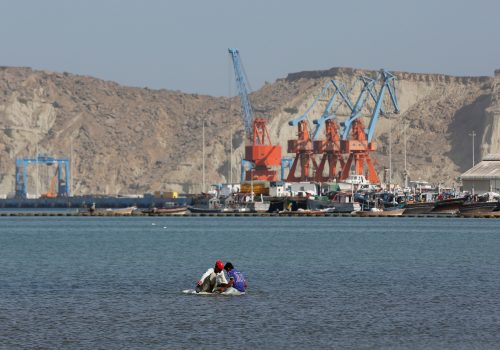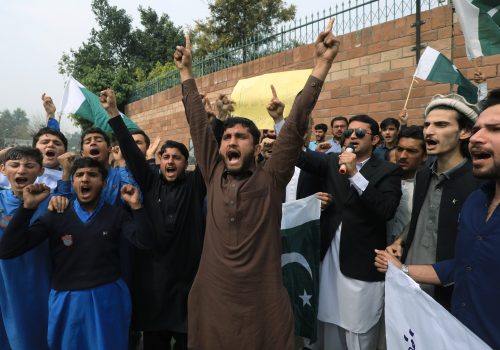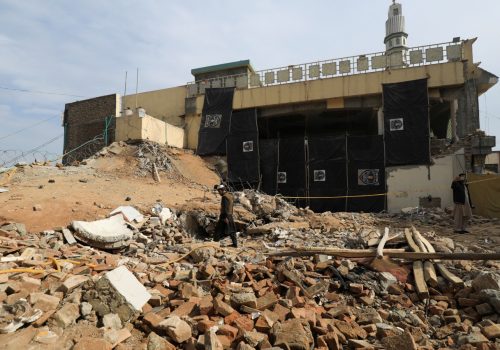Falcon26
SENIOR MEMBER

- Joined
- Dec 24, 2015
- Messages
- 2,753
- Reaction score
- 3
- Country
- Location
Who is behind the killings of Kashmiri militants in Pakistan?

Syed Khalid Raza, an educationist in Pakistan’s port city of Karachi, was killed outside his house in the city’s Gulistan-e-Juhar area in the last week of February 2023. This was no ordinary killing, however; Karachi is a city where resisting a mugging, or even political murder, is usually a non-event.
Questions arose when it turned out that the attackers, two men on a motorcycle, were not ordinary criminals. Upon investigation of the body, law enforcement agencies concluded that Raza was killed by an expert sharpshooter; he was shot in the head with a single bullet.
This led to the conclusion and a categorical denial by the police that it was a robbery gone awry. The final bit of evidence that helped reach this conclusion was that nothing was stolen from Raza, which begs the question: why would someone kill an educationist for no apparent reason?
This is where Raza’s past becomes relevant, for he was no ordinary educationist. Previously, Raza was an active member of Al-Badr, a jihadi group active in Indian-administered Kashmir in the 1990s. According to two people close to him, Raza left the group in the early 2000s following a crackdown against Kashmiri militant groups launched by then-military dictator General Pervez Musharraf.
More questions about Raza’s killing emerged after it was claimed by the Sindhudesh Revolutionary Army (SRA), an anti-Pakistan ethno-separatist group in the country’s Sindh province. Law enforcement agencies and Kashmiri militants indicated to the contributor that Raza’s assassination was part of an “organized” manhunt, where several other Kashmiri militants have been killed on Pakistani soil. A week prior to Raza’s assassination, a similar incident took place in Islamabad and the victim, Bashir Ahmed—alias Imtiaz Alam—also had a militant past.
Born in Srinagar, the capital of Indian-administered Kashmir, Ahmed was a member of Hizbul Mujahideen, a militant group that has operated in Kashmir for decades and is seen as one of the most violent among a plethora of such organizations.
Jalaluddin Mughal, a journalist based in Pakistan-administered Kashmir, wrotethat Ahmed was a close confidante of Syed Salahuddin, the supreme commander of Hizbul Mujahideen. According to Mughal, Ahmed had been injured in a clash with Indian troops in Srinagar in 1990, after which he was arrested and spent several months in jail. Upon his release, Ahmed crossed the border into Pakistan and settled in the country until his assassination in 2023; he was sixty years old at the time of his death.
Another such killing was reported in Karachi in March 2022, when the owner of a furniture shop in the city’s Akhtar Colony area was killed by unidentified motorcyclists.
The victim, identified as Zahid Akhund, also had a militant past. Akhund’s real name was Zahoor Ibrahim—alias “Mistry”—and he was part of a militant group that hijacked an Indian plane in Kathmandu in 1999, taking it over to Afghanistan which at the time was controlled by the Taliban. The Indian airliner was carrying 179 passengers and eleven crew members. The hostages were released following negotiations that resulted in Masood Azhar, Ahmed Omar Saeed Sheikh, and Mushtaq Ahmad Zargar all being freed; the trio were part of militant groups waging a war against India. Masood Azhar is the leader of outlawed group Jaish-e-Muhammad and Sheikh ended up working for al-Qaeda; the latter was ultimately arrested by Pakistani law enforcement in connection with the 2002 abduction and murder of Wall Street Journal reporter Daniel Pearl.
Who is behind these assassinations?
Those investigating the murders as well as their associates point fingers at India and its Research and Analysis Wing (R&AW), India’s lead intelligence agency. Individuals who attended the funeral prayers offered for Raza and Ahmed, on the condition of anonymity, told this contributor that several members of Kashmiri militant groups were also present to bid farewell to their former comrades. Following the funeral, these participants also raised anti-India slogans.Kashif (changing name on his request), whose family came to Pakistan in 1993 from Indian-administered Kashmir, told this contributor that Raza “without a shadow of a doubt” was killed by “Indian agents” working in Pakistan. He expressed his firm belief that others had also been assassinated by the same individuals. Kashif was angry with Pakistan and its military establishment, claiming that it was turning a blind eye to R&AW’s activities in the country because “Kashmir is no longer a priority.”
Another former Kashmiri militant, who now works as a journalist in Pakistan, had similar thoughts. According to him, those who had given their blood to the “cause of Kashmir’s freedom” and their families will blame Pakistani security agencies for the recent killings. He argued that R&AW’s involvement in these assassinations is evidence of the “failure” of Pakistani intelligence agencies.
While the governments in Pakistan and India have not officially commented on these assassinations, investigators in the port city of Karachi are “sure” that “elements associated with the Indian agencies” are involved in the murders.
An official of the counter-terrorism police in Karachi asserted that SRA, the group claiming responsibility for the killing of the former Al-Badr commander, gets its “support from R&AW.” The group, he maintained, has been involved in attacks on Chinese nationals, security agencies, and political groups in the past, but it has never shown any interest in former Kashmiri militants living in the country.
“In my opinion, R&AW ordered the hit and told SRA to claim its responsibility,” he said. “SRA doesn’t have a presence in Punjab, Kashmir, and Khyber Pakhtunkhwa”; he was referring to a bombing that took place outside Jamaat-ud-Dawah leader Hafiz Saeed’s residence in Lahore in 2021.
Will they make India-Pakistan relations even more volatile?
On a number of times, Pakistan has accused India of being involved in terrorist attacks in the country. In June 2021, a car bomb exploded outside the residence of Saeed and three people were killed. Saeed, who was in jail after being convicted by Pakistani courts in multiple cases for financing and abetting terrorism, remained unhurt.Pakistan blames India for the attack and Rana Sanaullah, the country’s interior minister and the man responsible for internal security, claimed in a press conference that the investigators found “undeniable proof” of New Delhi’s involvement in the bombing. Anti-terrorism courts in Lahore have so far sentenced seven to death regarding the Johar Town bombing.
Pakistan and India have already fought three wars over Kashmir and almost went to another after militants targeted Indian state forces in Pulwama, killing around forty troops. India blamed Jaish-e-Muhammad for the attack and its fighter jets enteredPakistani territory to conduct airstrikes against a suspected militant camp in Balakot. In response, Pakistan shot down two Indian fighter jets involved in the airstrike.
Global powers, including the United States and the United Arab Emirates, had to intervene to ease tensions between the two nuclear-armed countries. Since then, the pair have not had any significant skirmishes on the border and have made visible efforts to keep the calm and maintain the ceasefire on the Line of Control.
Pakistan’s military has also signaled a public desire to improve relations: General Qamar Javed Bajwa, the army chief who retired in November of 2022, askedboth his country and India to “bury the past and move forward” in an attempt to resolve the Kashmir dispute at a conference in 2021.
These remarks came in the backdrop of India’s August 2019 actions, when the government scrapped Article 370 of its constitution and revoked Kashmir’s special status, a move that angered both Pakistan and the pro-independence population in Indian-administered Kashmir.
Amid this tense calm, India also seems interested in resuming talks with Pakistan. Earlier this year, Delhi officially invitedPakistani Foreign Minister Bilawal Bhutto Zardari to attend a meeting of the Shanghai Cooperation Organization scheduled to take place in India in May; India has also extended an invitation to Pakistan’s defense minister.
Hopes for engagement remain, but assassinations could make things more unpredictable
This contributor has learned that Indian authorities hoped Pakistan would at least send Hina Rabbani Khar, the minister of state for foreign affairs, if not Bilawal Bhutto Zardari, to attend the moot. This trip, while unlikely to resume talks, may provide a “good signal” to help break the ice.Given these positive overtures from both Delhi and Islamabad, the assassinations in Pakistan may add volatility and once again ratchet up tensions. While militant groups that have operated in Kashmir are not as strong as they used to be, they still possess significant capabilities to strike back. The assassination of their former comrades, whether perceived or real, may trigger an angry response, thus endangering peace and stability in the region.
Similar things have happened in the past. A militant attack killed at least seventeen Indian soldiers in Uri in September 2016, just nine months after Prime Minister Narendra Modi made a surprise visit to Lahore to meet Nawaz Sharif, who was prime minister of Pakistan at the time.
Given this history, it is important for Pakistani and Indian leaders to engage with one another again. Reestablishing communication channels, especially between civilian leaders, will prove vital in the event of a revenge attack.
Without lines of communication—and keeping in mind the upcoming elections in Pakistan in 2023 followed by India in 2024—militant groups may take actions that could lead to increased instability in South Asia.
The author is an anonymous contributor.

The South Asia Centerserves as the Atlantic Council’s focal point for work on the region as well as relations between these countries, neighboring regions, Europe, and the United States.
Related content
 SouthAsiaSource Mar 9, 2023
SouthAsiaSource Mar 9, 2023With Pakistan’s economy in freefall, Chinese economic and military influence is likely to grow in the country
By Uzair YounusThis essay explores the potential impact of the ongoing crises on the China-Pakistan relationship and its implications for US-Pakistan bilateral relations, especially in the context of the growing strategic competition between the United States and China.
 SouthAsiaSource Mar 4, 2023
SouthAsiaSource Mar 4, 2023Can Swift Retort still inspire swift reforms?
By Ali HasanainAfter Operation Swift Retort four years ago, I argued that if Pakistan really wants to compete with India, it must focus on rapid economic growth. Regrettably, our national leadership has had other priorities, and we have fallen further behind.
 SouthAsiaSource Feb 2, 2023
SouthAsiaSource Feb 2, 2023For Pakistan, dealing with its Taliban problem is a walk on eggshells
By Javid AhmadIslamabad faces a lose-lose scenario against the Pakistani Taliban. But it is not too late for Pakistan to stop peeling the banana from the wrong end.
Image: FILE PHOTO: India's Border Security Force (BSF) soldiers stand guard at a checkpoint along a highway leading to Ladakh, at Gagangeer in Kashmir's Ganderbal district June 17, 2020. REUTERS/Danish Ismail/File Photo







